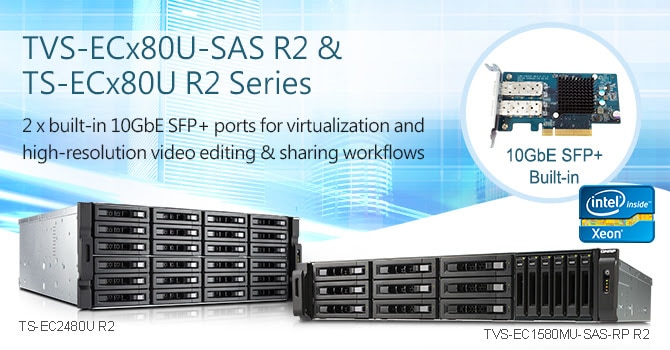Today QNAP Systems, Inc. announced that is has released two new enterprise-class rackmount NAS devices, the TVS-ECx80U-SAS R2 and TS-ECx80U R2 NAS series. These new devices are updates to the previous TVS-ECx80U-SAS/TS-ECx80U series, now with two built-in SFP+ based 10GbE ports but still the same price as the previous series.
Today QNAP Systems, Inc. announced that is has released two new enterprise-class rackmount NAS devices, the TVS-ECx80U-SAS R2 and TS-ECx80U R2 NAS series. These new devices are updates to the previous TVS-ECx80U-SAS/TS-ECx80U series, now with two built-in SFP+ based 10GbE ports but still the same price as the previous series.
Both new series have been launched so businesses can take advantage of 10GbE network connectivity without purchasing additional accessories. Both series are powered by QNAP’s OS, QTS 4.2. The OS brings capabilities such as QNAP’s auto-tiering, Qtier, SSD caching, cross-platform file sharing, iSCSI-SAN and virtualization, as well as feature-rich business applications including Virtualization Station for hosting VMs, Container Station for containerized virtualization, and Qsirch, the near real-time NAS search engine.
The TVS-ECx80U-SAS R2 series is equipped with a Xeon E3-1246 v3 3.5 GHz processor and 16GB DDR3 non-ECC or 8GB DDR3 ECC RAM. The TS-ECx80U R2 series provides models powered by an Intel Xeon E3-1246 v3 3.5 GHz processor and 4GB DDR3 ECC RAM, and further adds options with an Intel Core i3 3.5 GHz processor and 8GB DDR3 non-ECC or 4GB DDR3 ECC RAM. Both new series include four inbuilt Gigabit Ethernet ports but also two 10GbE SFP+ ports to fully support 10GbE high-speed networks. QNAP claims that new series can fully satisfy mission-critical storage needs, delivering persistent throughput to balance resource-demanding applications.
Availability
Both the TVS-ECx80U-SAS R2 and TS-ECx80U R2 NAS series are available now.
Sign up for the StorageReview newsletter

